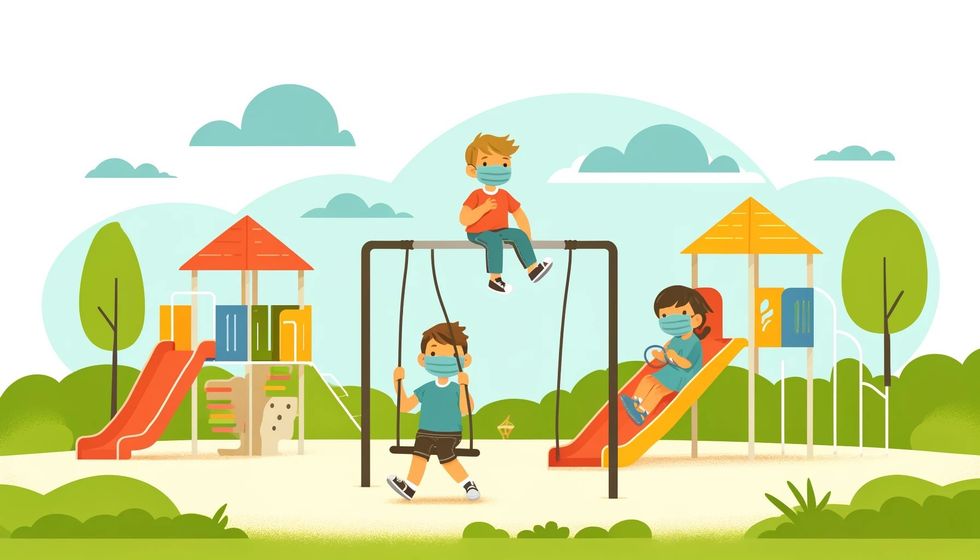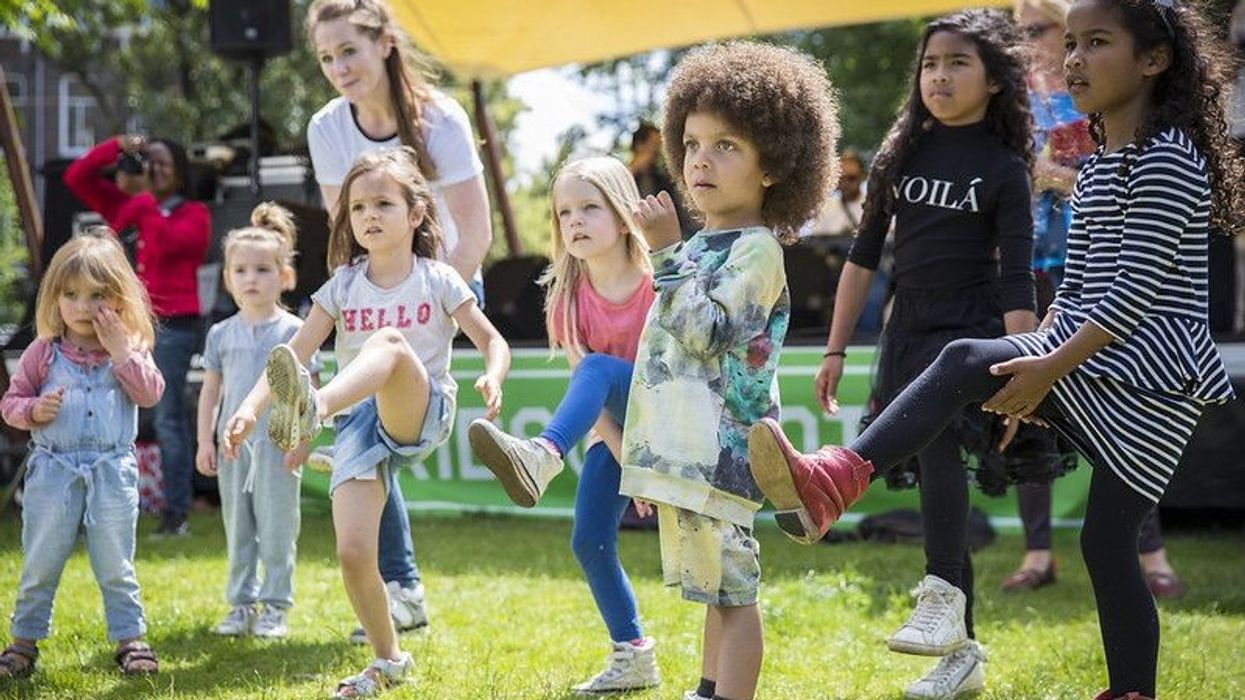As the weather cools, flu season arrives, raising parental concerns about children's safety at playgrounds, which can be hotspots for spreading influenza and other respiratory illnesses.
This article offers knowledge and preventive strategies to help parents and caregivers keep children safe during playground visits in flu season, covering everything from understanding influenza to implementing control measures.
The focus is on balancing fun with safety, highlighting the importance of flu vaccines, and recognizing early flu symptoms. This guide provides essential information to help families enjoy fall outings at the park without the threat of influenza.
Understanding Flu Season
As the cooler months approach, playgrounds continue to buzz with children enjoying the outdoors. However, flu season coincides with this time of year, increasing the risk of influenza spread among kids. Understanding flu season can help safeguard children from severe health complications.
- Flu Season Timeline: Typically, flu season in the United States peaks between December and February, but it can start as early as October and extend into late May. This period is critical for monitoring symptoms and taking preventive measures.
- Impact on Health: Each year, the flu affects millions, leading to significant numbers of hospitalizations and deaths. The Centers for Disease Control and Prevention (CDC) estimates that influenza has resulted in about 9-41 million illnesses annually since 2010 in the US.
- Virus Variability: The influenza virus constantly changes, which is why a new flu vaccine is developed each year to target the most commonly expected strains.
- Transmission in Playgrounds: Playgrounds can be hotspots for the flu virus, as it spreads through respiratory droplets when children cough, sneeze, or touch shared surfaces like swings and slides.
The Importance Of Flu Vaccines

The flu vaccine reduces the risk of illness by 40% to 60% among the overall population. It is especially important for children, who are more vulnerable to the virus, to get vaccinated annually. Here are some of the benefits of getting vaccinated:
- Reducing the severity of illness: In cases where vaccinated individuals do get sick, the vaccine can lessen the severity and duration of the flu.
- Protecting vulnerable groups: By vaccinating children, we also protect those around them, such as younger siblings, elderly family members, and those with weakened immune systems.
- Preventing hospitalizations: Vaccination significantly lowers the risk of flu-associated hospitalization among children and adults.
It’s best to get vaccinated before flu season begins, as it takes about two weeks for the vaccine to become effective. Early fall is ideal, ensuring that the vaccine's protection lasts through the season's peak.
By understanding the dynamics of flu season and recognizing the critical role of flu vaccinations, parents and guardians can take proactive steps to keep children healthy during playground outings during flu season.
The CDC recommends annual flu vaccinations for everyone, especially children, to bolster their immune system before the flu activity peaks.
Playgrounds And Respiratory Viruses
Playgrounds are common areas where children interact closely, which can lead to the spread of respiratory viruses such as the influenza virus or respiratory syncytial virus. It is essential to understand that influenza activity is more intense during flu seasons, making playgrounds potential hotspots for infection.
Here are some things you can do to improve safety for kids on the playground during flu season.
Encouraging Good Hygiene

To diminish the risk of influenza virus infection, encourage children to practice good hygiene. Frequent hand washing and the use of hand sanitizers can prevent the transfer of flu viruses. Teach children to cover their mouths with a tissue or elbow when they cough/sneeze to keep from spreading respiratory viruses.
Watch For Common Symptoms
Common symptoms of influenza-like illness include fever, sore throat, nasal congestion, body aches, and headaches. If a child displays these symptoms, it is best to keep them home to avoid infecting others. Remember that flu symptoms develop quickly, and a healthcare professional should assess any severe symptoms promptly.
Safe Play Practices
During peak flu activity, consider limiting the time children spend in communal play areas, as these can be breeding grounds for respiratory viruses to circulate. Opt for less crowded times to visit the playground and encourage physical distancing when possible.
Choosing The Right Time For Outdoor Play
Understanding influenza surveillance patterns can help in choosing safer times for outdoor play. During periods of high influenza activity, consider indoor alternatives for play and wait until flu activity decreases before resuming normal playground visits.
Flu Vaccination And Its Timing
Annual vaccination is advised by health experts, including the World Health Organization, as different flu vaccines cater to the most common strains expected in the forthcoming flu season.
Ideally, children should get a flu vaccination about two weeks before flu viruses are detected in the community to provide ample time for the immune response to develop.
Recognizing High-Risk Individuals
 Getty Images/iStockphoto
Getty Images/iStockphotoChildren with weakened immune systems or chronic medical conditions are at high risk for serious flu-related complications.
Extra precautions should be taken for these children during flu seasons, including ensuring they have received their flu shot and are monitored closely for any influenza-like symptoms.
When To Seek Medical Attention
Should a child develop symptoms of influenza infection, consult with a medical professional immediately, particularly if symptoms are severe or the child is considered high-risk.
Early use of antiviral drugs can sometimes mitigate severe flu-related complications.
Education And Awareness
Educate children about flu prevention and the importance of getting vaccinated against influenza. Schools and health departments often have resources and programs to promote immunization practices during the flu season.
Public health campaigns can also be valuable in spreading awareness and understanding the significance of annual flu season patterns.
Other Preventative Measures
Beyond getting a flu shot, dressing children warmly in cold weather, ensuring they stay hydrated, and getting adequate rest are effective ways to boost their overall health and immune system during flu season. A strong immune system is more capable of fighting off infections like the flu.
FAQs

Is it safe to let my child play in the playground during flu season?
It is generally safe as long as precautions are taken, such as ensuring good hygiene practices, avoiding crowded times, and making sure your child has received their flu vaccine.
How can I tell if my child has influenza or just a common cold?
Influenza symptoms often develop suddenly and include fever, which is less common with colds. Consulting a healthcare professional is the best course of action for a proper diagnosis.
Can influenza viruses be present on playground equipment?
Yes, flu viruses can survive on surfaces, so it's essential to maintain hand hygiene and consider wiping down equipment before use, especially during flu season.
What additional steps can we take at home to reduce the risk of flu after visiting a playground?
After visiting a playground, it's crucial to have children wash their hands immediately with soap and water. If soap and water are not readily available, use a hand sanitizer with at least 60% alcohol.
Also, consider changing their clothes and having them take a bath to remove any potential germs they may have come into contact with during play.
How effective are flu vaccines for children, and when is the best time to get them?
Flu vaccines have been shown to significantly reduce the risk of catching influenza, particularly among children. The best time to get a flu vaccine is before the start of the flu season, typically in early fall, as it allows the body to build immunity before flu viruses become widespread.
Should playdates be avoided entirely during flu season?
Playdates need not be avoided entirely but should be approached with caution. Limiting playdates to small groups, ensuring that all involved children are healthy, and practicing good hygiene can help minimize the risk. If any of the children start showing flu-like symptoms, it would be wise to reschedule.
Can the flu be spread on outdoor playground equipment?
Yes, the flu virus can survive on surfaces, including outdoor playground equipment. While outdoor environments typically lessen the chance of transmission, it is still possible for children to catch the flu if they touch contaminated surfaces and then touch their faces. Regular sanitization of hands after playing can help prevent this.
How can I educate my child about flu prevention without causing them anxiety?
Use positive and age-appropriate language to teach your child about flu prevention. Focus on the things they can control, like washing their hands and wearing appropriate clothes for the weather, rather than the consequences of getting sick.
Make it part of a routine so it doesn't feel like a response to an immediate threat, which can reduce anxiety.
How long does the flu virus remain active on surfaces?
The flu virus can remain active on hard surfaces for up to 48 hours. To disinfect play equipment, you can use disinfecting wipes or sprays that are effective against viruses.
Always follow the product's instructions for the correct application and contact time to ensure proper disinfection.
To keep your child safe and healthy at the playground during flu season, prioritize flu vaccination, good hygiene, and a strong immune system (through exercise, diet, and sleep).
Staying informed about new flu strains and health recommendations is also essential, as is considering updated vaccinations based on public health announcements. This proactive approach helps create a safer environment for children to play and thrive, regardless of the season.
Related Articles Around the Web






 Getty Images/iStockphoto
Getty Images/iStockphoto





